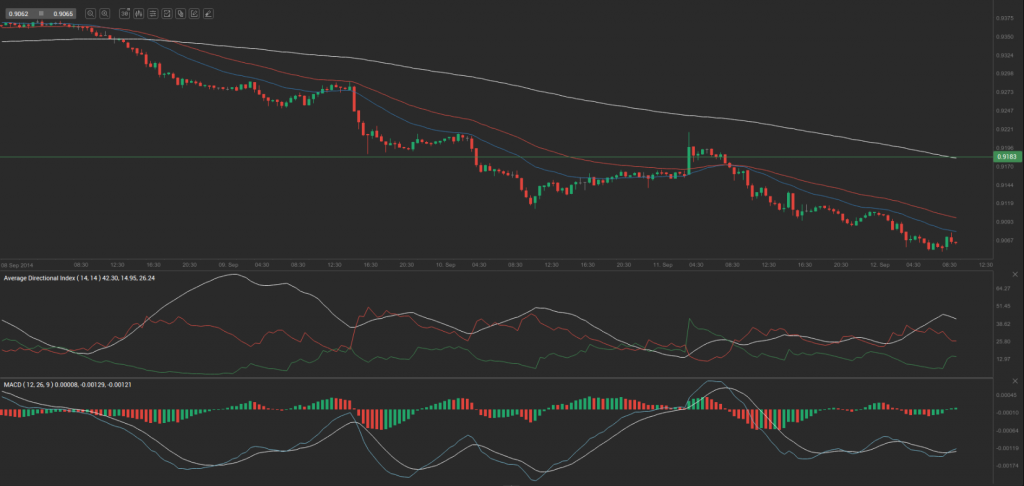Yesterday’s trade saw AUD/USD within the range of 0.9084-0.9217. The pair closed at 0.9100, losing 0.61% on a daily basis.
At 7:19 GMT today AUD/USD was down 0.37% for the day to trade at 0.9066. The pair broke all three key weekly supports and touched a daily low at 0.9053 at 5:40 GMT.
Fundamental view
Australia
The number of the employed in Australia increased by the record 121 000 to reach 11 703 500 in August, which led to a drop in the rate of unemployment to 6.1% last month from 6.4% in July. Full-time employment increased by 14 300 to 8 094 300 in August, while part-time employment rose by 106 700 to 3 609 200, according to data by the Australian Bureau of Statistics, released on Thursday. The seasonally adjusted participation rate climbed 0.4% to 65.2%.
Following the release of the report, AUD/USD received a boost, climbing to a daily high of 0.9217, but gains were neutralized later in the day.
United States
Retail Sales Index
Retail sales in the United States probably increased 0.6% in August on a monthly basis, according to the median forecast by experts. In July sales remained flat, as sales at auto dealers continued to decrease and receipts in furniture and electronics and appliances stores weakened. Sales at auto dealerships dropped 0.2% in July, following another 0.3% fall in June. Annualized retail sales climbed 3.7% in July, or the slowest pace since February.
The report on retail sales reflects the dollar value of merchandise sold within the retail trade by taking a sampling of companies, operating in the sector of selling physical end products to consumers. The retail sales report encompasses both fixed point-of-sale businesses and non-store retailers, such as mail catalogs and vending machines. US Census Bureau, which is a part of the Department of Commerce surveys about 5 000 companies of all sizes, from huge retailers such as Wal-Mart to independent small family firms.
US core retail sales (retail sales ex autos) probably rose 0.3% in August compared to a month ago, following a 0.1% gain in July. This indicator removes large ticket prices and historical seasonality of automobile sales.
The retail sales index is considered as a coincident indicator, thus, it reflects the current state of the economy. It is also considered a pre-inflationary indicator, which investors can use in order to reassess the probability of an interest rate hike or cut by the Federal Reserve Bank. In addition, this indicator provides key information regarding consumer spending trends. Consumer expenditures, on the other hand, account for almost two-thirds of nation’s total Gross Domestic Product. Therefore, a larger than expected increase in sales would heighten the appeal of the US dollar. The official report is due out at 12:30 GMT.
Michigan University/Reuters Consumer Sentiment
The monthly survey by Thomson Reuters and the University of Michigan may show that consumer confidence in the United States improved in September. The preliminary reading of the corresponding index, which usually comes out two weeks ahead of the final data, probably rose to 83.2 during the current month from a final value of 82.5 in August. The survey encompasses about 500 respondents throughout the country. The index is comprised by two major components, a gauge of current conditions and a gauge of expectations. The current conditions index is based on the answers to two standard questions, while the index of expectations is based on three standard questions. All five questions have an equal weight in determining the value of the overall index.
The sub-index of current economic conditions climbed to 99.8 from a preliminary reading of 99.6 in August, after being at 97.4 in July. Augusts final reading is the highest figure since July 2007. The sub-index of consumer expectations came in at a reading of 71.3, improving from a preliminary value of 66.2 in August, but falling from 71.8, registered in July.
In case the gauge of consumer sentiment showed a larger improvement than projected, this would boost demand for the greenback. The official reading is due out at 13:55 GMT.
Technical view
According to Binary Tribune’s daily analysis, the central pivot point for the pair is at 0.9134. In case AUD/USD manages to breach the first resistance level at 0.9183, it will probably continue up to test 0.9267. In case the second key resistance is broken, the pair will probably attempt to advance to 0.9316.
If AUD/USD manages to breach the first key support at 0.9050, it will probably continue to slide and test 0.9001. With this second key support broken, the movement to the downside will probably continue to 0.8917.
The mid-Pivot levels for today are as follows: M1 – 0.8959, M2 – 0.9026, M3 – 0.9092, M4 – 0.9159, M5 – 0.9225, M6 – 0.9292.
In weekly terms, the central pivot point is at 0.9347. The three key resistance levels are as follows: R1 – 0.9432, R2 – 0.9487, R3 – 0.9572. The three key support levels are: S1 – 0.9292, S2 – 0.9207, S3 – 0.9152.






